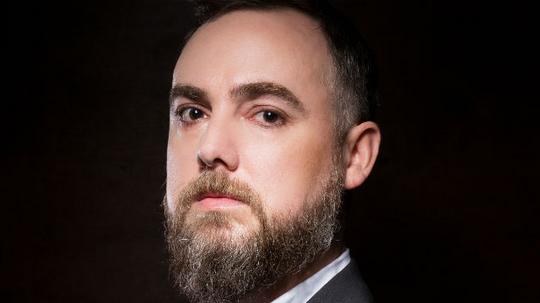
This is the latest installment in our DC Innovators project to profile 75 of the most innovative people in D.C. Today, we're featuring Gavin Daniels, the co-founding principal at Wingate Hughes Architects. Our 75 profile subjects will also be finalists for our 50 on Fire awards in December. Daniels shared some details about his background and creative process with us in a Q&A, which you can read below.
Know some people we should include? Nominate them here.
Gavin Daniels, co-founder of Wingate Hughes Architects, said his business runs on the principal of going “all-in” for clients. We asked him about exactly what that means and how it drives his decision-making. So far, his choices have paid off; the firm has grown rapidly since launching in 2010 and is known for building the coolest office interiors in D.C.
Daniels attributes the success to prioritizing the relationship aspect of his work, which caters primarily to the growing D.C. tech community. Here's what else we learned about him.
Your firm works primarily with the tech community. Why was the tech scene particularly appealing as an architect?
We noticed that the tech community wasn't getting a lot of respect—I'm talking about the guys that were just getting going. That's a world that doesn't get a lot of attention, but there are a lot of people in that world, and we cared about those people. We could identify with those kinds of people and we believed in them, just like we believed in ourselves.
Has relationship-driven design always been a value at your organization?
There has always been a focus on relationships with the clients. We felt we had a better way than [other firms]—we wanted to get back to the people. We didn't have any money at first, but we just knew we would do whatever it takes to make a space work for a client.
In any industry, there is the pitfall of thinking too much like everyone else. How do you challenge yourself to think differently?
We start with the basics when it comes to thinking differently, with paints and finishes. We regularly throw things out of our library and force ourselves to think of new ideas so we can avoid doing things over and over again. The next part has to do with a lot of reading and staying up with trends. Lately, we've been reading a lot about education theory and how it applies to building an office.
We're looking at the understanding that people learn in different ways. That's accepted in the world of education, and we are looking at the ways we can incorporate that into the office. There are more and more accommodations that kids can have to be successful—what if the office was focused on learning like that?
What is an unlikely place that you find sources of inspiration?
I would say at Fatty's Tattoo shop in D.C. I was talking with my tattoo artist about his equipment, the way he sets it up and the way he makes his ink—the craftsmanship that goes into that. Naturally I started thinking about office spaces; he was able to take his space and customize it in the right way for him. It made everything about his day more relaxed and you really want to be in the right frame of mind before you sit down with someone you don't know and talk for three hours.
What job have you had that has had the greatest impact on your career?
Working with Manhattan Construction in Dallas and San Antonio. Being out in the field gave me such an appreciation for the men and women that build our buildings. I have a better understanding of what the lines mean when I draw them.
How will your industry change the most in the next five years?
I think that personally in our office, we'll have a more mobile office. We are graphic-intensive users; too often we are chained to our desks because we need the big monitors. For the industry as a whole, I think that you're going to have more thinking about an entire building as the work environment, rather than just the office suite. You're going to need architects that can keep up.
What makes Washington D.C. unlike anywhere else when it comes to innovation?
We have people that just care about each other. This is part of what drew me the to tech community: they all know each other and talk to each other. There's enough competition out there; but there is such a pride in what happens here. That wasn't anything we invented, it's just something everyone who comes into the city has adapted and become a part of. That's a family and I really do value that a lot.
What’s something that you do every single day, no matter what you have going on?
Even if I've been swamped at work, I'll sit down at the house and draw something with my 7-year-old daughter. No matter what, I'm going to draw something every day.
Who is someone you admire in D.C.?
It would have to be Ray Ritchey—he's part of a huge real estate company. Ray had been a mentor of mine since before I started [Wingate Hughes]. He's the most humble, approachable person you've every met in your life. He's given me advice over the years; he tells me he believes in me and gives me his perspective. He’s always been so valuable to me.




